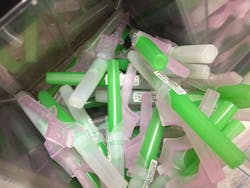ABB Robotics to develop solutions for the hospital of the future
A recent press release stated that ABB announced it will introduce collaborative robots to medical laboratories as it opens a new healthcare hub at the Texas Medical Center (TMC) innovation campus in Houston, Texas.
The facility will be ABB’s first dedicated healthcare research center when it opens in October 2019. ABB’s research team will work on the TMC campus with medical staff, scientists and engineers to develop non-surgical medical robotics systems, including logistics and next-generation automated laboratory technologies.
Sami Atiya, President of ABB’s Robotics and Discrete Automation business said, “The next-generation laboratory processes developed in Houston will speed manual medical laboratory processes, reducing and eliminating bottlenecks in laboratory work and enhancing safety and consistency. This is especially applicable for new high-tech treatments, such as the cancer therapies pioneered at the Texas Medical Center, which today require manual and time-consuming test processes.”
Today, a limiting factor to the number of patients who can be treated is the need for highly skilled medical experts who spend a large part of their day doing repetitive and low value tasks, such as preparing slides and loading centrifuges. Using robots to automate these tasks will enable medical professionals to focus on more highly skilled and productive work, while ultimately helping more people to receive treatment through dramatically speeding the testing process.
ABB has analyzed a wide range of current manual medical laboratory processes and estimates that 50 percent more tests could be carried out every year using automation, while training robots to undertake repetitive processes will reduce the need for people to do tasks which cause repetitive strain injury.
As the world population ages, countries are spending an increasingly larger proportion of their GDP on healthcare. In addition to improving the quality of patient care, increasing healthcare efficiency through automation can ease some of the societal, political and financial challenges that this will cause. The market for non-surgical medical robots is estimated to reach nearly 60,000 by 2025 with the market almost quadrupling vs. 2018, according to an internal ABB research.
ABB’s collaborative robots, which already operate in food and beverage laboratories worldwide, are well suited to medical facilities as they don’t require safety fences to operate safely and efficiently alongside people. The robots will undertake a range of repetitive, delicate and time-consuming activities including dosing, mixing and pipetting tasks as well as sterile instrument kitting and centrifuge loading and unloading.

